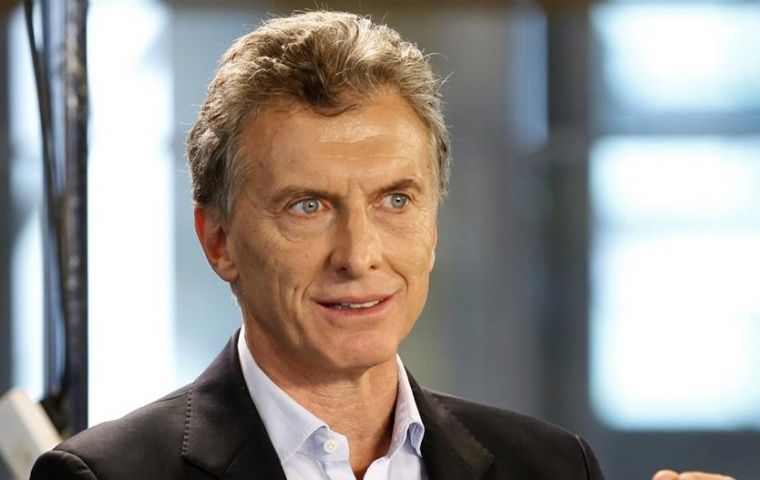MercoPress. South Atlantic News Agency
Macri tries to calm down Argentines as US dollar goes up
 Macri also said that fluctuations in the exchange rate are part of the ”supply and demand flows.
Macri also said that fluctuations in the exchange rate are part of the ”supply and demand flows. Argentine President Mauricio Macri Tuesday said Argentines should “not worry about the dollar,” as the US currency rose 13 cents, closing at AR$ 17.18. It will “benefit regional economies and job creation,” he added during a radio interview.
Macri also said that fluctuations in the exchange rate are part of the “supply and demand flows” and that, contrary to being a “concern”, it is a “benefit”.
“The Central Bank has plenty of reserves, a lot more than we had 18 months ago when we only had negative reserves,” Macri added. Tens of billions of dollars are said to be in the treasury, “so Argentines should not worry about the dollar,” he told Cadena 3 radio of Cordoba.
The US dollar kept its upward trend, closing at an average rate of AR$ 16.74 (buy) / AR$ 17.18 (sale), according to Argentina's Central Bank. Foreign currency traders warned that Tuesday's action had been relatively calm due to the Fourth Of July Independence Day holiday in the United States and that only US $ 190.7 million were traded.
In the Rofex futures market, US $ 267 million were traded, 60% of which was in July roll-over at $ 17.14 and at August at $ 17.39. The longest run was October at $ 17.94 with an implicit rate of 18.30% annual rate.
Cabinet Chief Marcos Peña said on Tuesday morning that the rise in the dollar is part of a “predictable and possible” situation, and said that the oscillation in the price “is performing in a context of normalcy and tranquility.”
Peña also explained that “since December 10, 2015 we have a floating exchange market, which is very important because it just gives the currency flexibility in the face of the variations that may occur.”
He also acknowledged that “there are different visions and pressures,” with “those who believe that the dollar is behind and that, in order to encourage production and exports and the competitiveness of our economies, it has to be allowed to rise and on the other end of the questions there are those who believe not.”
Economists now estimate that the US dollar will reach the AR$ 18.50 rate by the end of the year.




Top Comments
Disclaimer & comment rules-

-

-

Read all commentsreekie: “...Central Bank supports the peso by selling dollars from reserve funds...”
Jul 07th, 2017 - 02:18 pm +4Unstable third-world countries with flimsy economies, low productivity, massive inflation, egomaniacal management, and frangible currencies have to do this to give their façade pesos the appearance of some sort of value. A country whose economy is not based on reliable, productive output of goods and services is a sham. It doesn't matter which party is decorating the Pink House in this country, because the culture cannot and will not support effective monetary and economic practices and instead relies upon cycles of bluster, circus, entropy, and failure, in what has come to be known as the “efecto defaulto.”
Idiot child Enrique Massot (aptly named Reekie) is unable to understand, that the Argentine peso is vastly overrated.
Jul 05th, 2017 - 11:28 pm +3After many years of high inflation during the Cristina Kirchnerista regime and with the resulting further inflation when the present government corrected some of the most outrageous financial mistakes committed under the “Model”, la cotización (exchange rate) should be somewhere between 21:1 to 23:1 and not as low as 17:1. The far too low exchange rate prevents industria Argentina from exporting industrial products, something the idiot child Enreekie, who lives as far away from Argentina as is possible in the Americas, cannot comprehend.
Related article in the argie media today showing how the long-standing self-destructive economic policies of the country continue to keep its goods and services non-competitive: for a new car produced in Argentina, nearly 55 percent of the cost to produce and sell that vehicle is due to taxes, while for a vehicle produced in Brazil the rate is about 13 percent. You'd think that the ever-popular Toyota Hilux camioneta built in Argentina would be just naturally sold in neighbouring Chile. Not anymore. Those vehicles are now non-competitive in Chile, where their distributor currently imports them from Thailand for a much lower net cost.
Jul 06th, 2017 - 03:05 am +3Can't Argentina reduce taxes? Not really. The low productivity of the country is causing dangerous and increasing levels of deficit spending, which is one of the reasons that the peso is being devalued (and will likely go through more devaluation soon). Cut spending? Not likely. We've already seen the rioting that results from trying to reduce subsidies, social plans that promote excessive irresponsible breeding, an enormous bureaucracy, and the atrocious burden of overcompensated nonessential public employees.
That leaves ... incentives for increasing productivity.
Not gonna happen here. If anything, we're likely to see penalties for increasing productivity.
ARS just reported as 17.4 to the dollar. That's going to make it harder to pay off those dollar loans.
Commenting for this story is now closed.
If you have a Facebook account, become a fan and comment on our Facebook Page!